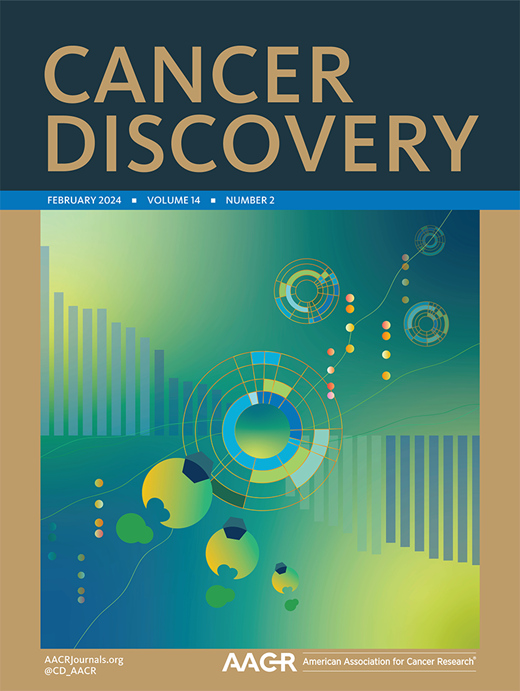通过乙酰化激活T细胞固有的p53引发抗肿瘤免疫以促进癌症免疫治疗。
IF 33.3
1区 医学
Q1 ONCOLOGY
引用次数: 0
摘要
尽管p53在肿瘤抑制中起着核心作用,但它是如何在T细胞中调控发挥抗肿瘤作用的尚不清楚。在这里,我们发现在免疫治疗过程中,通过羧基末端结构域(CTD)乙酰化激活T细胞内在p53激活IFN-γ途径,促进CD8+ T细胞浸润,并引发CD8+ T细胞依赖性抗肿瘤免疫。使用T细胞特异性敲入小鼠模型,我们证明了T细胞中CTD乙酰化的缺失会破坏CD8+ T细胞依赖的抗肿瘤免疫,而T细胞中CTD乙酰化模拟p53的表达会增强这种免疫反应。此外,我们确定IFNG是T细胞内在p53的直接靶标,并发现p53和IFN-γ途径之间存在正反馈回路,以增强T细胞依赖性抗肿瘤免疫。我们的研究表明,CTD乙酰化介导的T细胞内在p53的激活促进了对免疫治疗的抗肿瘤免疫反应,突出了p53通过调节过继免疫反应的非肿瘤细胞自主机制。本文章由计算机程序翻译,如有差异,请以英文原文为准。
Activation of T cell-intrinsic p53 by acetylation elicits antitumor immunity to boost cancer immunotherapy.
Although p53 plays a central role in tumor suppression, how it is regulated in T cells to exert antitumor effects remains unclear. Here, we show that activation of T cell-intrinsic p53 via carboxyl-terminal domain (CTD) acetylation during immunotherapy activates the IFN-γ pathway, promotes CD8+ T cell infiltration, and elicits CD8+ T cell-dependent antitumor immunity. Using T cell-specific knockin mouse models, we demonstrate that loss of CTD acetylation in T cells abrogates CD8+ T cell-dependent antitumor immunity whereas expression of CTD acetylation-mimicking p53 in T cells enhances this immune response. Moreover, we identify IFNG as a direct target of T cell-intrinsic p53 and uncover a positive feedback loop between p53 and the IFN-γ pathway for enhancing T cell-dependent antitumor immunity. Our study reveals that CTD acetylation-mediated activation of T cell-intrinsic p53 promotes antitumor immunity in response to immunotherapy, highlighting a non-tumor cell-autonomous mechanism of p53 action by regulating adoptive immune responses.
求助全文
通过发布文献求助,成功后即可免费获取论文全文。
去求助
来源期刊

Cancer discovery
ONCOLOGY-
CiteScore
22.90
自引率
1.40%
发文量
838
审稿时长
6-12 weeks
期刊介绍:
Cancer Discovery publishes high-impact, peer-reviewed articles detailing significant advances in both research and clinical trials. Serving as a premier cancer information resource, the journal also features Review Articles, Perspectives, Commentaries, News stories, and Research Watch summaries to keep readers abreast of the latest findings in the field. Covering a wide range of topics, from laboratory research to clinical trials and epidemiologic studies, Cancer Discovery spans the entire spectrum of cancer research and medicine.
 求助内容:
求助内容: 应助结果提醒方式:
应助结果提醒方式:


